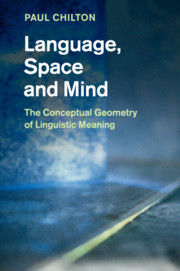Description
Language, Space and Mind
The Conceptual Geometry of Linguistic Meaning
Author: Chilton Paul
A new approach to linguistic meaning and grammatical constructions based on simple geometric principles.
Language: English
Subject for Language, Space and Mind:
Prix indicatif 36,76 €
Disponible chez l'éditeur (délai d'approvisionnement : 14 jours).
Add to cart
Language, Space and Mind
Publication date: 12-2019
Support: Print on demand
Publication date: 12-2019
Support: Print on demand
Prix indicatif 98,15 €
Disponible chez l'éditeur (délai d'approvisionnement : 14 jours).
Add to cart
Language, Space and Mind
Publication date: 07-2014
319 p. · 15.7x23.5 cm · Relié
Publication date: 07-2014
319 p. · 15.7x23.5 cm · Relié
Résumé
/li>Sommaire
/li>Biographie
/li>
The idea that spatial cognition provides the foundation of linguistic meanings, even highly abstract meanings, has been put forward by a number of linguists in recent years. This book takes this proposal into new dimensions and develops a theoretical framework based on simple geometric principles. All speakers are conceptualisers who have a point of view both in a literal and in an abstract sense, choosing their perspective in space, time and the real world. The book examines the conceptualising properties of verbs, including tense, aspect, modality and transitivity, as well as the conceptual workings of grammatical constructions associated with counterfactuality, other minds and the expression of moral force. It makes links to the cognitive sciences throughout and concludes with a discussion of the relationship between language, brain and mind.
1. Introduction: space, geometry, mind; 2. Viewpoint, reference frames and transformations; 3. Distance, direction and verbs; 4. Event types and cognitive operators; 5. Times, tenses and reference frames; 6. Counterfactual reflections; 7. Reference frames and other minds; 8. Mental distance and complement clauses; 9. Verbs, complements and their conceptual effects; 10. The deontic dimension; 11. Concluding perspectives.
Paul Chilton is Emeritus Professor of Linguistics at Lancaster University.
© 2024 LAVOISIER S.A.S.




